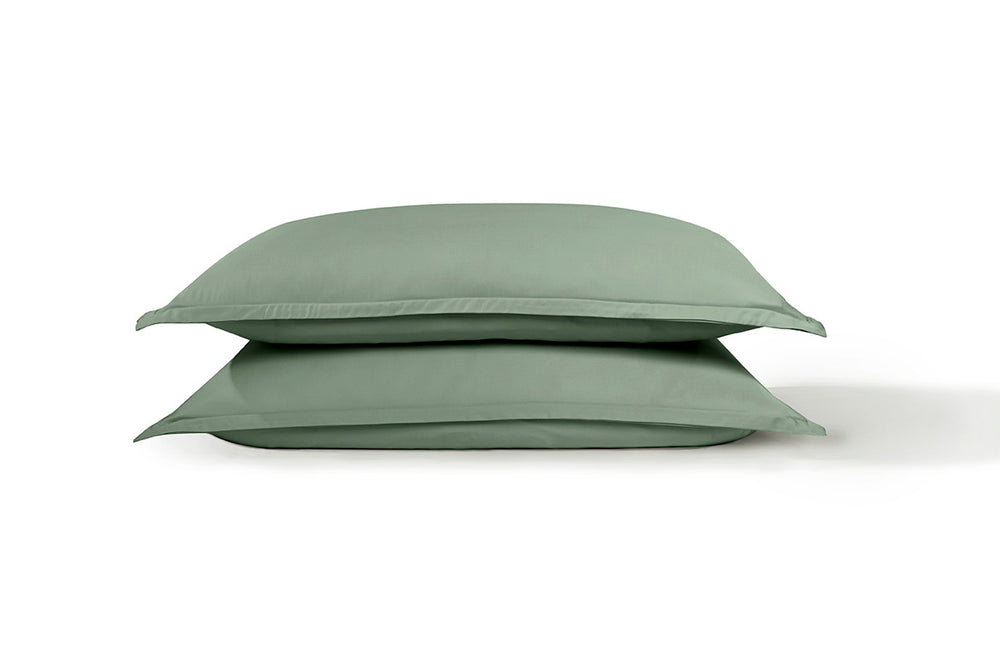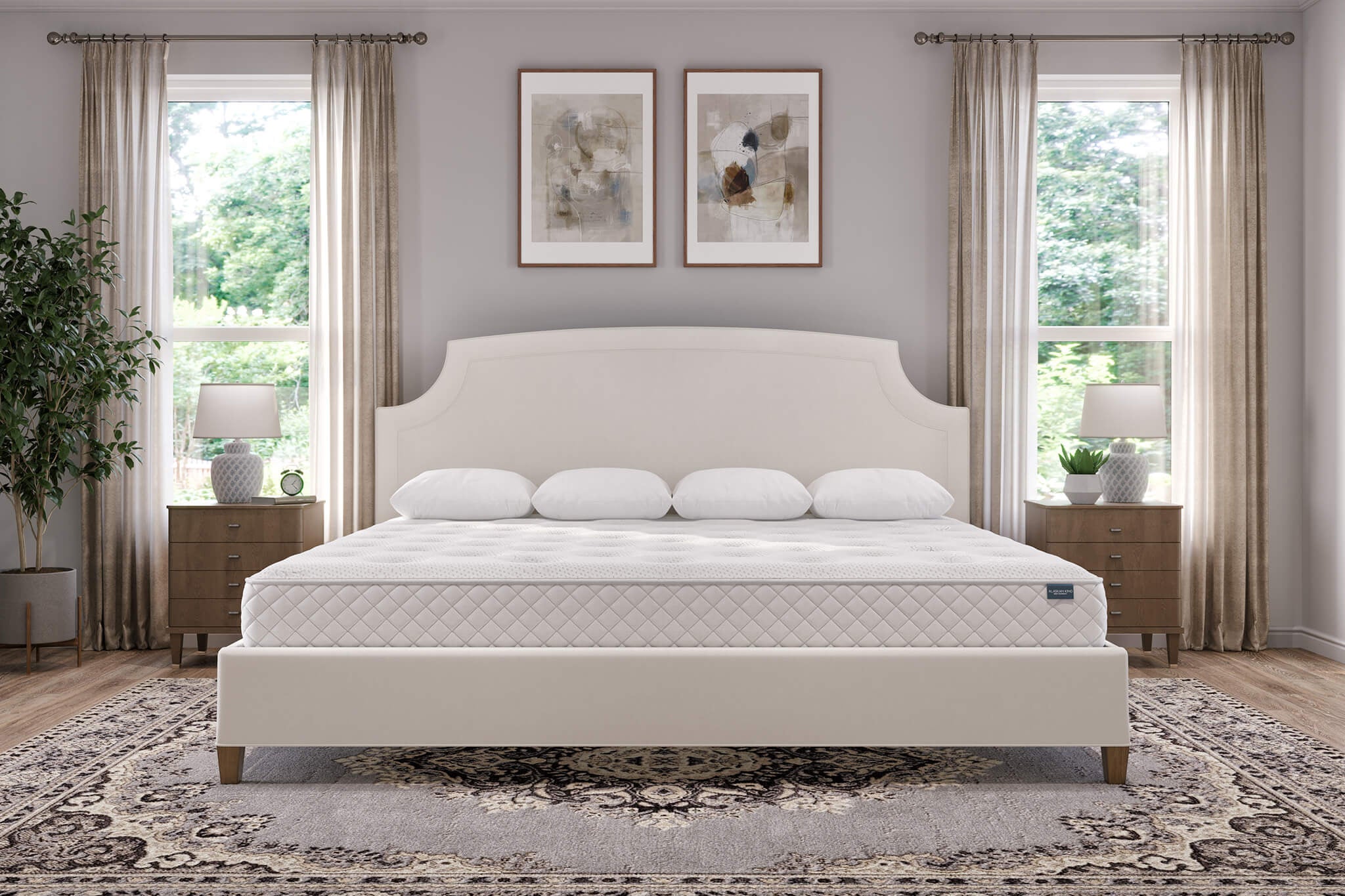Sleep & Hormones: What Parents Need to Know About Changing Sleep Needs
Does sleep feel different lately?
You’re more exhausted than ever, but somehow it’s harder to fall asleep, and even harder to stay asleep. Maybe your partner is tossing more than usual. Maybe your toddler is waking up every few hours. Or maybe your once-cozy bed suddenly feels too hot, too crowded, or just off.
If this sounds familiar, you’re not imagining it.
As we move through different stages of parenting and adulthood, our hormones go through big (and sometimes sneaky) changes that can seriously impact how we sleep. From postpartum shifts to perimenopause, testosterone dips to cortisol spikes, these hormonal fluctuations affect everything from how quickly we fall asleep to how rested we feel in the morning.
In this guide, we break down the most common hormone-related sleep changes for parents and share tips to help everyone in the family get better rest.
How Hormones Influence Sleep
Sleep might feel like a simple routine, but under the surface, it’s a carefully orchestrated process powered by your hormones. These chemical messengers regulate everything from your mood and metabolism to how deeply you sleep and when your body decides to wake up.
Here are the key players you should know:
- Melatonin: Often called the “sleep hormone,” melatonin helps regulate your internal clock. As it rises in the evening, it signals your body to wind down. However, stress, screen time, and irregular routines can throw it out of sync.
- Cortisol: This is your body’s natural alarm system. Cortisol helps you feel alert in the morning, but if your stress levels are high, it can stay elevated at night and make it hard to fall asleep or stay asleep.
- Estrogen and progesterone: For women, these hormones rise and fall throughout the menstrual cycle, during pregnancy, and through perimenopause and menopause. They influence sleep quality, temperature regulation, and even how often you wake up at night.
- Testosterone: While often overlooked in sleep discussions, testosterone also plays a role in regulating sleep cycles, especially deep, restorative sleep. It tends to decline with age and chronic stress, which can lead to lighter, more disrupted rest.
When these hormones are balanced, sleep tends to come easily. When they shift, which they often do during parenthood, aging, or periods of stress, sleep can quickly become fragmented, shallow, or elusive altogether.
Sleep Changes in Moms: From Pregnancy to Perimenopause
If you’ve felt like your sleep has been on a rollercoaster since becoming a mom, that’s because it has. Hormonal shifts in women are some of the most dramatic, and they directly affect how you fall asleep, stay asleep, and how rested you feel when the alarm goes off (or, more likely, when your kid climbs into bed at 5 AM).
Here’s how different stages of motherhood can impact sleep:
Pregnancy
Sleep during pregnancy can feel impossible. One month you’re nodding off at 7 PM, the next you’re tossing and turning all night. That’s because hormonal shifts start almost immediately, and they don’t let up for nine months.
In the first trimester, a surge in progesterone can make you feel drowsy during the day but oddly restless at night. As your body works overtime to support your growing baby, you might also deal with nausea, frequent trips to the bathroom, and vivid dreams – all of which disrupt sleep cycles.
By the third trimester, physical discomfort becomes a major factor. Aches, kicks, heartburn, and the size of your belly can make finding a comfortable sleep position feel impossible. Add in elevated estrogen and oxytocin levels (which affect temperature regulation and nighttime awakenings), and it’s no wonder so many pregnant women report poor sleep.
A supportive, spacious bed can make a real difference here, especially one that allows you to switch positions easily and stretch out without waking your partner.
Postpartum & Breastfeeding
After your baby arrives, sleep changes dramatically.
In the first few weeks postpartum, estrogen and progesterone levels plummet, which can trigger night sweats, emotional ups and downs, and shallow, fragmented sleep. At the same time, prolactin, the hormone responsible for milk production, rises, which may bring drowsiness, but not necessarily deep rest.
Breastfeeding moms usually sleep in shorter bursts and feel tired throughout the day, even after getting a few decent stretches of sleep. And because babies wake frequently to feed, the body never quite reaches the deeper, more restorative stages of the sleep cycle.
You may also be sharing your bed with your baby during this time, which makes comfort and space essential. A larger mattress with better motion isolation can go a long way in helping everyone settle more easily.
Motherhood in Your 30s and 40s
Even after the baby years, sleep doesn’t always go back to “normal.” In fact, many women in their 30s and 40s start to notice new sleep challenges that aren’t always easy to pin down.
Stress plays a huge role here. Juggling work, parenting, household responsibilities, and your own needs can send cortisol levels into overdrive. Elevated cortisol makes it harder to fall asleep and stay asleep, especially when your mind won’t stop racing the moment your head hits the pillow.
At the same time, hormonal fluctuations tied to your menstrual cycle can become more pronounced in your 30s and early 40s. Many women notice trouble sleeping in the days leading up to their period, thanks to shifts in progesterone and estrogen that affect mood, body temperature, and sleep depth.
You may not be waking up for nighttime feedings anymore, but you might still be up at 3 AM, wide awake and wondering why. The truth is that your body is changing, and your sleep needs a little extra support to keep up.
Perimenopause
Perimenopause often shows up first in your sleep. This transitional phase typically begins in your 40s (though for some it starts earlier) and marks the slow decline of estrogen and progesterone levels. These changes impact your menstrual cycle and affect your ability to fall and stay asleep.
Many women experience:
- Hot flashes and night sweats
- Frequent nighttime awakenings
- Increased sensitivity to light, noise, and temperature
- Difficulty getting back to sleep after waking
These symptoms can disrupt your natural sleep cycles and leave you groggy, irritable, and drained, even after what should have been a full night of rest.
And because perimenopause often overlaps with some of the busiest years of parenting, the result is a perfect storm of stress, physical discomfort, and interrupted sleep.
Sleep Changes in Dads: The Quiet Shift
Dads might not always talk about it, but their sleep changes too. Between work stress, increased responsibility, and the emotional load of fatherhood, many men experience sleep disruptions that don’t always get the attention they deserve.
It’s not uncommon for dads to take on late-night feedings, help older kids back to sleep, or wake up early to tackle the day before the rest of the house stirs. Over time, this takes a toll.
There’s also a physiological shift at play. As men age, testosterone levels naturally decline, especially after 30. Lower testosterone is linked to lighter, less restorative sleep and more frequent nighttime wake-ups. Add in stress-related spikes in cortisol, and you’ve got a recipe for restless nights and foggy mornings.
The problem is that most dads don’t seek help or even realize what’s happening. They assume being tired is just part of the job. However, better sleep isn’t just a luxury – it’s a necessity, especially when you’re showing up for your family day after day.
Creating a supportive, spacious sleep environment can help both partners rest more deeply, even if parenting keeps you on your toes. And sometimes, that starts with simply having enough room to stretch out and breathe.
How to Support Your Family’s Changing Sleep Needs
Understanding how hormones impact sleep is the first step. Now it’s time to give your body the support it needs to adapt.
Even small changes in your routine and environment can make a big difference for both you and your partner. Here are a few ways to help your family sleep better:
1. Create a Consistent Wind-Down Routine
Your brain loves patterns. A consistent bedtime routine, such as dim lights, skincare, journaling, or a calming podcast, can help cue your body to start producing melatonin. Try winding down 30-60 minutes before bed and encourage your partner to do the same.
2. Watch the Timing of Light and Screens
Hormones like melatonin are deeply tied to your exposure to light. Morning sunlight helps reset your sleep-wake cycle, while too much screen time delays melatonin production. Try stepping outside first thing in the morning and limiting screens an hour before bed.
3. Keep Stress in Check (As Much as You Can)
Easier said than done, right? But even short, consistent habits like deep breathing, a quick walk, or simply stretching before bed can help reduce cortisol and ease the transition into sleep. A calmer nervous system means better rest for everyone.
4. Prioritize Comfort in Your Sleep Setup
As your body becomes more sensitive to temperature, pressure, and motion, your mattress matters more than ever. A spacious, breathable, and supportive bed can help reduce wake-ups and relieve the aches and restlessness that come with hormonal changes.
If you’re sharing a bed with your partner, kids, or pets, the extra space of a family-size mattress can enable everyone to sleep more soundly without crowding or constant movement.
Sleep Changes, But Comfort Shouldn’t
Your sleep will change, that’s just part of life, aging, and parenthood. Some nights will be better than others, and your body will have different needs in different seasons. However, comfort should always be non-negotiable.
Whether you’re navigating postpartum shifts, perimenopause, or just the everyday chaos of raising a family, your bed should support you through it all.
Our giant beds are spacious, supportive, and built for the real-life rhythms of parenthood, not just Pinterest-perfect snapshots.
If your sleep has changed, maybe it’s time your bed did too. Explore our handcrafted Alaskan King mattresses and give your family the comfort they deserve.








